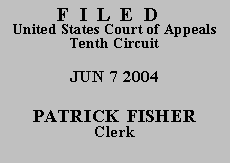

| C. ELI-JAH HAKEEM MUHAMMAD, a/k/a Christopher Hijrah Mitchell, |
No. 04-1002 (D.C. No. 03-Z-1935) (D. Colo.) |
Petitioner, appearing pro se and in forma pauperis,(1) filed this petition for a writ of habeas corpus pursuant to 28 U.S.C. § 2241 challenging the disciplinary action. The district court dismissed his petition, and this appeal followed. Petitioner asserts that he was deprived of due process because he was unaware that his conduct violated PAC No. 319 and because there was insufficient evidence to find Petitioner guilty of the violation.
The Due Process Clause guarantees due process only when a person is to be deprived of life, liberty, or property. Meachum v. Fano, 427 U.S. 215, 223 (1976). Transferring a prison inmate to a more restrictive prison environment ordinarily does not deprive the inmate of liberty. Id. at 225. However, an inmate may be deprived of liberty if subjected to a restraint that "imposes atypical and significant hardship on the inmate in relation to the ordinary incidents of prison life." Sandin v. Conner, 515 U.S. 472, 483-84 (1995). In Sandin v. Conner, the Supreme Court held that a prisoner who was sentenced to 30 days in disciplinary segregation had not demonstrated a liberty interest protected by the Due Process Clause. Id. at 475-76, 486. "Discipline by prison officials in response to a wide range of misconduct falls within the expected perimeters of the sentence imposed by a court of law." Id. at 485.
In this case, Petitioner has not demonstrated that his move from a less restrictive to a more restrictive unit was an "atypical and significant hardship." Petitioner was not placed in special confinement, see Gaines v. Stenseng, 292 F.3d 1222, 1224 (10th Cir. 2002), but rather remained in a general prison population, albeit in a more restrictive classification. Thus, Petitioner fails to allege an "atypical and significant hardship." In addition, there is no evidence that the change in the nature of Petitioner's confinement affected the length of his confinement. Accordingly, Petitioner has demonstrated no liberty interest protected by the Due Process Clause.
We AFFIRM the judgment of the district court.
ENTERED FOR THE COURT
David M. Ebel
Circuit Judge
*.After examining appellant's brief and the appellate record, this panel has determined unanimously that oral argument would not materially assist the determination of this appeal. See Fed. R. App. P. 34(a)(2) and 10th Cir. R. 34.1(G). The case is therefore ordered submitted without oral argument. This Order and Judgment is not binding precedent, except under the doctrines of law of the case, res judicata, and collateral estoppel. The court generally disfavors the citation of orders and judgments; nevertheless, an order and judgment may be cited under the terms and conditions of 10th Cir. R. 36.3.
1.Based on our review of Petitioner's financial declarations, we grant his motion to proceed in forma pauperis on appeal. See 28 U.S.C. § 1915(a)(1).